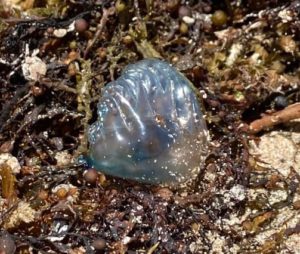Treatment for Jellyfish Stings

There has been a fair amount of discussion on social media in San Carlos recently about the appearance of jellyfish (most often bluebottle) on our beaches and in the water. There have been several sightings this year, so caution is advised when swimming and enjoying our beautiful beaches.
Jellyfish stings can be very painful but rarely require medical treatment. If you are stung you will likely experience intense pain and see a line, welts or blisters in the affected area. First aid care should include carefully picking out any visible tentacles with fine tweezers, a glove, or even a piece of fabric. Rinsing the affected area with vinegar can an effective treatment in the case of some jellyfish species but not in others. Bluebottle jellyfish (the most commonly sighted here) stings should not be treated with vinegar, as it may cause increased pain.
Next, soak the affected area in hot water. Ideally the water will be 43 to 45°C (110 to 113 F). If a thermometer isn’t available you can test the water to ensure that it feels hot but not scalding. The affected area should be immersed or remain in a hot shower for 20 to 45 minutes. This should significantly reduce the pain from the sting.
There are many “home remedies’ that should be avoided. These include scraping out the stingers with a credit card, peeing on the site, rubbing with a towel or applying meat tenderizer, baking soda, alcohol, ethanol or ammonia. These treatments will result in increased pain for the patient and should be avoided.
When to seek medical help
While most jellyfish stings won’t have dangerous symptoms or long lasting effects, it is possible to have a severe reaction due to allergies or the type of jellyfish. If the patient experiences nausea or vomiting, loses feeling in the limb that was stung, has difficulty breathing, or experiences heart palpitations after being stung you must seek medical assistance immediately.
Prevention
The best way to avoid jellyfish stings is to scan the area where you intend to swim. If there are a lot of jellyfish on the beach, then there are probably a lot in the water and you should swim elsewhere. Please note that jellyfish on the beach, even those that are dead or dying, can still have venom in their stingers and should be avoided. The best way to avoid stings is to wear a light wet suit or specialized swim clothing. Even a long-sleeved T-shirt or a pair of pantyhose will help!
Remember Rescate can now be reached at 911. Be sure to specify that you want a Rescate ambulance.